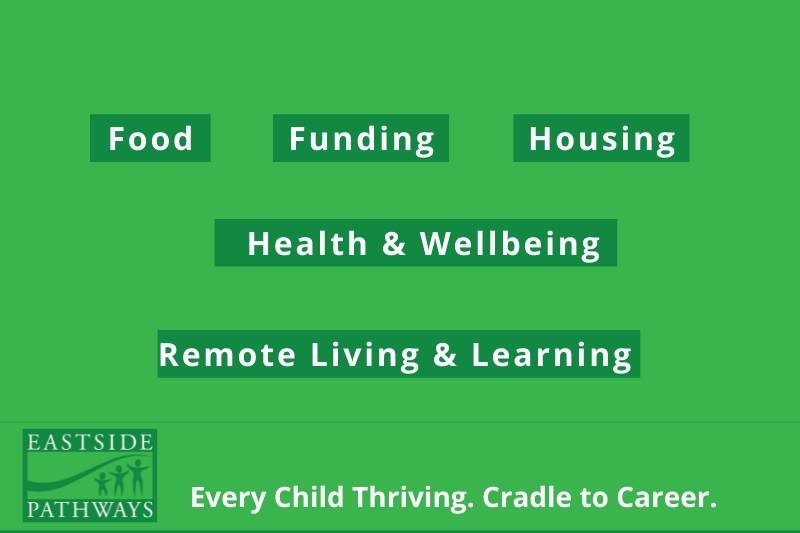It has been almost a year and half since Eastside Pathways shifted gears by holding a space to discuss the new challenges that quarantining brought and to leverage the urgency of change in our community.
Since March 2020, the Covid-19 Response Collaborative Action Network (CAN) has expanded and contracted with the needs of our community. In the first few months, the meetings focused on rapid fire cross-sharing qualitative and quantitative data from grass tops and grassroots. This enabled a shared understanding of the landscape in E King County and helped us hone in on five immediate areas of need:
- Food
- Funding
- Health & Wellbeing
- Remote Living & Learning
- Housing
Since then, these five groups have continued to commit to “ensuring everyone in E King County has what they need to survive and thrive during this dire time.”
Here are some of the adaptive efforts being implemented by these Partners:
Food – Food distribution challenges go beyond is there enough, especially in Phase 1 and even now as the school year comes to an end. The group works tirelessly to advocate for stories nested within wealth and programming gaps. Individualized support to navigating food access systems and cross-sector alignment to ensure that state level initiatives speak to the needs of people on this side of the lake. This includes organizing and supporting food drives as well as connecting trusted leaders in the community to critical food distribution information.
Funding – The group used data and their critical relationships to focus on examining the funding culture and patterns in E King County, particularly as a sub-set of King County as a whole. Once the cloak of wealth was lifted, the group recognized clear disparities in who was being served equally and equitably. The group researched and partnered with Hispanic/Latino community members and organizations to examine funding distribution and impacts.
Health & Wellbeing – Recognizing that personal and feminine hygiene products are not covered by EBT, this group dove into how to address not only the technical but the adaptive issues as it relates to these critical resources. The focus was on the intersection of age, sexual orientation, and gender identity as it relates to accessing personal and feminine hygiene products. This includes procuring and distributed products as well as communication strategies to continue tackling the stigma in this area.
Remote Living & Learning – The group began by focusing on Pre-K through 5 grade, but rapidly expanded to support students and families through High School. They worked on a three-pronged strategy: building two-way communications and relationships with Spanish speaking families; building critical relationships at the administrative and site-based school district leadership; and developing and promoting digital newsletters geared towards Spanish speaking families with information from the Bellevue and Lake Washington School District catchment areas.
Housing – This was one of the hardest hit sectors in our community and we expect it will continue to be. While trying to manage the crisis situation, leaders and partners from all focus groups continue to cross-share information and resources to try and support those who are at risk of eviction or are waiting the impending end of the moratorium.
Our deepest gratitude to each and every one of the participants and their organizations and communities that support them in doing adaptive work while also managing their daily responsibilities.
Based on the feedback received through a recent poll, the Eastside Pathways Backbone staff will continue to convene the group every two months so that they can continue to:
- Cross-share process and progress updates and challenges
- Use data to drive action/decisions
- Receive coaching and support to maintain an adaptive leadership stance and thrive
For more information, contact Kalika Curry, Community Impact Manager

